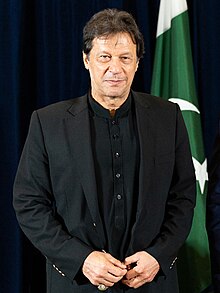 | |
| Premiership of Imran Khan August 18, 2018 – April 10, 2022 | |
President |
|
|---|---|
| Cabinet | Imran Khan government |
| Party | Pakistan Tehreek-e-Insaf |
| Election | 2018 |
| Seat | Prime Minister's Office |
|
| |
| ||
|---|---|---|
|
Personal Cricket career Post-premiership |
||
The premiership of Imran Khan began when Imran Khan became the 22nd prime minister of Pakistan on 17 August 2018, following his oath of office ceremony, which came after his party, the Pakistan Tehreek-e-Insaf secured a victory in the 2018 Pakistani election. His campaign in the elections primarily focused on anti-corruption and populism.
Imran Khan was sworn-in as the Prime Minister of Pakistan on 18 August 2018 at the Aiwan-e-Sadr in Islamabad.[1] His cabinet consisted of sixteen ministers and five advisors. He kept portfolio of interior ministry to himself.[2] In his celebration speech before swearing in and the inaugural speech after swearing-in he mentioned that he will build and run Pakistan on principles of first Islamic state of Medina.[3][4]
When he took office, he presented a 100-day plan to quickly reform the country in a short period of time. He made significant changes to the country's bureaucracy and military with several key appointments. Khan's cabinet included many Musharraf-era ministers and former members of the Pakistan People's Party. His government undertook major cabinet reorganizations and faced financial challenges that led to an IMF bailout and the implementation of austerity measures. By 2020, Pakistan's balance of payments improved, fiscal deficit narrowed and tax collections had reached record levels.
Khan's foreign policy tried to make Pakistan a respected player on the international stage. He emphasized the unity of Muslims in his efforts against Islamophobia and his leadership in the OIC. Khan and his close foreign minister, Shah Mehmood Qureshi, established good relations with Saudi Arabia, although he announced that he would seek to mediate between Iran and Saudi Arabia in their proxy conflict. Khan maintained a firm stance on the Kashmir issue and refused to negotiate with India until autonomy was restored in Indian-administered Kashmir. Khan also criticized the US drone campaign in Pakistan and said the Taliban-led Afghan government should be recognized and not isolated.
Domestically, Khan's government launched an anti-corruption campaign and improved security. His administration restored minority religious sites. In social policy, he reformed education, improved health care and expanded large welfare programs, the most notable of which were the Ehsaas Programme and Sehat Sahulat Program. His government passed the Zainab Alert Bill as an attempt to increase the rights and safety of women in Pakistan. His environmental initiatives, mainly Plant for Pakistan, increased renewable energy and attempted extensive reforestation of Pakistan. Khan has been criticized for certain comments and practices, even as he has been praised for handling the COVID-19 pandemic in Pakistan, launching a massive welfare program and reviving the economy greatly.
He was removed from office in March 2022 following a no-confidence motion against his government, in which many of his coalition partners left his government, resulting in his removal as the first Pakistani prime minister to be removed by a no-confidence motion. Despite his tenure lasting three and a half years, his premiership saw important reforms in many areas, supporting domestic policies of welfare, an active foreign policy stance on many global issues, and key steps against corruption.
- ^ Guramani, Nadir (18 August 2018). "Prime Minister Imran Khan: PTI chairman sworn in as 22nd premier of Pakistan". dawn.com. Retrieved 18 August 2018.
- ^ Dawn.com (18 August 2018). "PM Imran Khan finalises names of 21-member cabinet". dawn.com. Retrieved 19 August 2018.
- ^ "Prime Minister Imran Khan promises sweeping reforms in inaugural address". www.thenews.com.pk. Retrieved 19 August 2018.
- ^ "Imran Khan's speech in full". www.aljazeera.com. Retrieved 7 August 2018.

